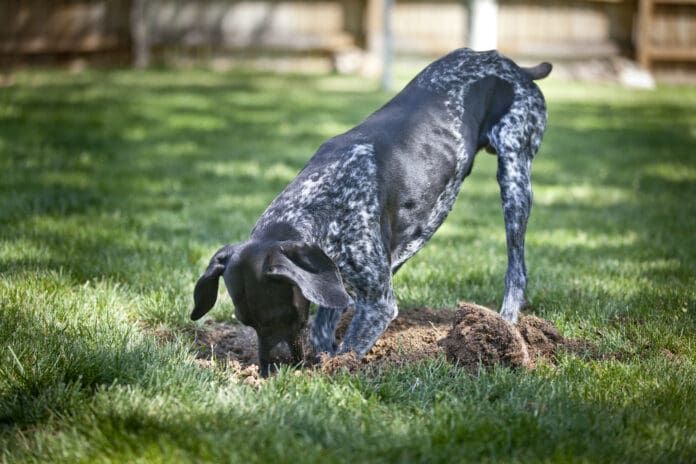It’s another one of those Great Dog Mysteries: why your dog suddenly develops the need to dig colossal holes to nowhere in your pristine, unblemished lawn or to turn your picturesque garden into a mini excavation site. Are they in search of invasive creatures like gophers and voles? Are they doing it because perhaps once upon a time, a bone was buried there? Are they doing it just because it’s fun, like a child digging in a sandpile?
Maybe all of the above. You can rest assured they’re not doing it to drive you crazy or to exact revenge on you for skimping on their treats.
Why Dogs Dig Holes: The Role of Genetics
Some dog breeds are genetically predisposed to digging. In Dachshunds, for example, a key breed characteristic is digging to follow small prey into underground burrows and tunnels. This instinct is so strong that merely finding a disturbance in the soil can be enough to stimulate their prey drive, and thus inspire the digging behavior. The same is true for breeds like terriers, beagles, schnauzers, and even hounds. And of course, when those dogs end up discovering a tasty morsel like a grub after digging—or they actually encounter that elusive gopher, which in turn triggers a wild and gleeful chase—that digging behavior gets reinforced.
That being said, it’s important not to equate breed with behavior: although a dog’s breed can help us predict how likely a certain behavior is to occur, breed alone isn’t responsible for an individual dog’s disposition: in fact, breed accounts for less than ten percent of a dog’s overall behavior. Certified behaviorist Victoria Schade says that “a dog’s overall life experience is a better predictor of the way they’ll interact with the world around them than what their breed standards says.”
And yet, all dogs are “hard-wired” to dig: their ancient ancestors dug to locate or hide food, to find a place to give birth, to create dens to keep their pups safe and warm, to mark their territory, to find cooler ground to lie in on hot days. Even though many of these traits have no real purpose in our modern world, they’re so engrained in dog DNA that the behavior endures. As annoying or destructive as it may appear to us, in most cases digging is a perfectly rational, innate canine behavior.
In recognition of this, the AKC has even developed an Earthdog Test that measures how good a “digger” your dog really is in pursuing and finding rodents underground.
Other Reasons Why Dogs Dig
Studies have clearly shown that not just a dog’s breed, but his personality, current environment, anxiety level, as well as earlier life experiences can have a profound effect on digging behavior. For instance, if you live in a place where summers are hot and your dog is a thick-coated Nordic breed like a Samoyed, Siberian Husky, or Malamute, you’re much more likely to see them digging a hole to get to the cooler ground below.
Aside from instinctual hunting impulses and the desire to regulate their body temperatures, there are other reasons why your dog might become a digging fool.
Hoarding. In their wolfish past, canines instinctively dug holes in order to stockpile food for lean times or for winter when food was scarce. This can be seen in today’s dogs, when even though their caretakers provide ample food, they may revert to this behavior by burying items like bones.
Escape. In most cases, escape routes involve digging under, jumping over, or even climbing up fences. These canine escape artists might want to reach another dog for play or mating, they might have been prodded by a child teasing them from the other side of the fence or another dog acting aggressively, they might want to socialize with humans at a neighborhood get-together (or, like my dog Frankie, simply hang around construction workers at a neighbor’s house because she thinks that being with people means it’s a party), they might have been frightened by something in the yard, or they may simply want to explore.
Attention-seeking. It may seem counter-intuitive, but some dogs dig holes in order to get their caretaker’s attention. It doesn’t matter if the human’s reaction is negative, because for the dog, simply having the attention of their caretaker is enough. Certified animal behaviorist Maddie Messina explains it this way: “If digging earns them attention from their human companions, dogs may continue the behavior as a means of seeking interaction. There’s nothing more rewarding to a social animal like a dog as their human giving them attention, so if a dog learns this works for them, the unwanted behavior will be reinforced.” And it will continue.
Lack of space or exercise. Animal researcher Dr. Johannes Odendaal makes the point that large and active dogs kept in a small back yard often suffer from insufficient exercise due to lack of space. Unless their caretaker takes pains to walk them frequently, digging can become their way of exercising.
Anxiety or boredom. Some types of dog behaviors have boredom or stress as an underlying cause; digging becomes just another way for them to cope with tedium, extreme energy, or emotions. Research shows that separation anxiety in particular can cause many destructive behaviors, including compulsive digging. For instance, if a dog with separation anxiety is confined in a yard while their caretaker is away, it may start digging, explains veterinarian Dr. Stacy Johnson. “These dogs may incessantly dig—even to the point of injury—to reunite with their owner.” A dog that’s highly motivated to do something but is physically unable to do it may start digging in frustration: an example would be a dog that feels territorial aggression toward another dog, but is prevented from acting on that territoriality because it’s behind a fence.
Play. We know from interacting with our dogs that their mouths and front legs are the main sources of their kinetic energy: they play tug-of-war, carry around toys, wave their legs in the air when they get a belly-rub, and use their feet to paw at us. It makes perfect sense that if they’re looking for a way to entertain themselves, they’ll chew on an object or dig holes. (Or dig a hole and bury their treasure in it!) We humans may see it as destructive behavior, but for the dog it’s probably just a form of play.
To scent-mark. Observational studies show that dogs often dig at or scratch the ground after urination or defecation, which can deposit scent from the urine or feces as well as from the scent glands on their feet. In addition, some researchers believe that the ground disturbance may act as a visual cue to other animals. However, at this point these theories are very speculative, since the behavior hasn’t been formally researched enough to arrive at unequivocal conclusions. “Stand by for more discussions of why dogs ground scratch,” says ethologist Dr. Mark Bekoff, author of The Emotional Lives of Animals. “There still is much to learn, and it’s clear that there is much more going on than meets our eye.”
How To Stop a Dog From Digging
If your dog is being truly destructive in his digging, one strategy is to redirect and reward him for digging in a designated digging spot. That might be something like a corner of the yard, a sandpit or sand pile, or even a kiddie pool containing either sand or scraps of old fabric and toys.
If the behavior appears to be extremely repetitive or compulsive and the dog is in genuine distress, you need to get professional veterinary advice so she can be properly diagnosed and treated.
As for training your dog not to dig, that can be problematic at best. First, you need to determine what’s at the root of his problem digging. Is it boredom? Lack of exercise? Frustration? Aggression? Is he just having fun? Or is there something more serious going on that needs veterinary consultation? Each one of these causes requires a different approach and, unfortunately, the reality is that no matter what you do, you’ll probably be unsuccessful in your efforts to make him stop, since digging is as natural to him as eating.
But no matter what the underlying reason is for your dog’s digging proclivities, chances are that you may have to simply grin and bear it and recognize that she’s just being a dog.





